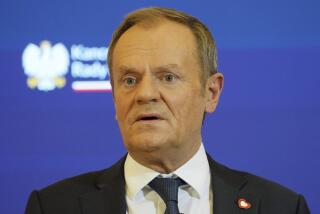Not Bad, but Not Good Enough : Poles Seek Real Political Reform, Not Economic Compromise
- Share via
The economic reform package announced last weekend by the Polish government represents a major step in the right direction.
Nonetheless, it is unlikely to reverse Poland’s economic decline, mainly because critical political issues have yet to be addressed.
On paper, the program is both radical and impressive.
Item: The proposed decentralization of the Polish economy would allow factory managers to decide not only what they should produce, but also how to allocate the profits they make. They could offer incentives for promising ideas and to productive people and thus encourage innovation.
Item: The proposed curtailment of extensive subsidies would make for a measure of economic efficiency. While the initial effect will be higher prices, especially for the basic necessities that have been heavily subsidized, in the longer run a more realistic pricing system is likely to create pressures for economic decisions to be made by economic, rather than political, criteria.
Item: Enhanced competition and improved productivity could follow the government’s willingness to encourage private enterprise--not only in agriculture and the service sector but in retail business and small industry as well.
Item: By allowing unproductive factories to go bankrupt, the government hopes to make workers produce or face the prospect of at least temporary unemployment.
But will the program work?
External conditions are admittedly favorable. The Soviet Union, which would have expressed reservations about such a program even a few years ago, is surely rooting for it. After all, what Gen. Wojciech Jaruzelski’s government is proposing to do is similar to what Soviet leader Mikhail S. Gorbachev has been advocating in his nation.
In addition, the economic reforms will be welcomed by Western financial institutions, which are now likely to provide new credit and postpone old debts.
Still, the ultimate fate of the new program will not be decided abroad; it will be decided by the Polish people.
Indeed, Jaruzelski’s main problem is the continuing absence of domestic support. The public is in no mood to make what the government considers the necessary economic sacrifices without the government concurrently undertaking what the public considers the necessary political sacrifices.
The people want Poland to be autonomous of Moscow and they want the Solidarity labor union that they had in 1980-81 to be legalized and re-created under the leadership of that still immensely popular electrician, Lech Walesa.
Call it patriotism, idealism or just plain determination, they seek no compromise.
For its part, however, the government cannot deliver.
Call it realism or excessive fear, Jaruzelski looks at the map, sees the Soviet behemoth next door, and claims that Polish independence is a pipe dream. Call it stubbornness combined with misplaced pride, Jaruzelski also cannot humble himself to negotiate with “that electrician” in Gdansk.
Put another way, the key to the effective implementation of Polish economic reforms is meaningful political change. The key to political change is Lech Walesa.
People in Poland ask: If Gorbachev could return Soviet academician Andrei Sakharov from his exile in Gorky to his institute in Moscow, why can’t Jaruzelski sit down with Nobel Peace Prize winner Walesa to discuss the future of Poland? If the economy can be subjected to market forces, which is, after all, a hallmark of capitalism, why can’t Jaruzelski tolerate an independent labor union under the ideological rubric of “socialist pluralism”?
The problem with the Polish government, as it was with its predecessors, is that it overestimates its popular appeal as much as it underestimates the depth of Polish hostility toward communism, both old-fashioned and reformist.
This is why the current proposal is likely to encounter more skepticism and hostility than the government expects. Not because it is a bad proposal; it is a promising proposal. But the Polish people are tired of promises, do not trust Gen. Jaruzelski’s government and want political change of the type that signifies genuine participation.
If the political changes that are expected to be announced in November offer such genuine participation, the public may still warm up to the government’s economic program.
In the meantime it is useful to keep in mind that, unlike in English, the Polish word for compromise, for better or for worse, denotes something contemptible that honorable men do not make.
More to Read
Sign up for Essential California
The most important California stories and recommendations in your inbox every morning.
You may occasionally receive promotional content from the Los Angeles Times.










